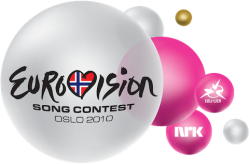| Eurovision Song Contest 2010 | |
|---|---|
| Share the Moment | |
 | |
| Dates | |
| Semi-final 1 | 25 May 2010 |
| Semi-final 2 | 27 May 2010 |
| Final | 29 May 2010 |
| Host | |
| Venue | Telenor Arena Oslo, Norway[1] |
| Presenter(s) | |
| Directed by |
|
| Executive supervisor | Svante Stockselius |
| Executive producer | Jon Ola Sand |
| Host broadcaster | Norsk rikskringkasting (NRK) |
| Website | eurovision |
| Participants | |
| Number of entries | 39 |
| Number of finalists | 25 |
| Debuting countries | None |
| Returning countries | |
| Non-returning countries | |
| |
| Vote | |
| Voting system | Each country awarded 12, 10, 8–1 points to their 10 favourite songs. |
| Winning song | |
The Eurovision Song Contest 2010 was the 55th edition of the Eurovision Song Contest. It took place in Oslo, Norway, following the country's victory at the 2009 contest with the song "Fairytale" by Alexander Rybak. Organised by the European Broadcasting Union (EBU) and host broadcaster Norsk rikskringkasting (NRK), the contest was held at the Telenor Arena, and consisted of two semi-finals on 25 and 27 May, and a final on 29 May 2010, tying with the 1999 edition for the contest hosted the latest.[1][3] The three live shows were presented by Norwegian television presenters Erik Solbakken and Nadia Hasnaoui and singer Haddy N'jie.[2]
Thirty-nine countries took part in the contest, with Georgia returning after its one-year absence. Meanwhile, Andorra, the Czech Republic, Hungary and Montenegro ceased their participation, mainly for reasons related to the 2007–2008 financial crisis. Lithuania originally announced its non-participation, but was later among the participants confirmed by the EBU.[4][5]
The winner was Germany with the song "Satellite", performed by Lena and written by American Julie Frost and Denmark's John Gordon. The song won both the jury vote and televote and was Germany's second victory in the contest, following 1982. It was also its first win as a unified country. It was also the first win for one of the "Big Four" countries since the rule's introduction in 2000. Turkey, Romania, Denmark and Azerbaijan rounded out the top five. Romania, finishing third, equalled their best result from 2005, while further down the table, Georgia achieved their best result to date, finishing ninth. For the first time since the introduction of semi-finals in 2004, Sweden failed to qualify for the final. The last time Sweden was absent from a Eurovision final was in 1976.
The global financial crisis at the time affected how the event was run; the host broadcaster NRK was forced to sell its broadcast rights for the 2010 FIFA World Cup to TV 2 and Viasat in order to finance the event.[6]
Prior to the contest, the EBU announced that the voting system used in the semi-finals would change from previous years to balance jury voting with televoting. A return of accompaniment by orchestra was also proposed, but ultimately did not occur.
- ^ a b Cite error: The named reference
Telenorwas invoked but never defined (see the help page). - ^ a b Bakker, Sietse (10 March 2010). "Nadia, Haddy and Erik to host 2010 Eurovision Song Contest". European Broadcasting Union. Archived from the original on 8 April 2014. Retrieved 10 March 2010.
- ^ "NRK press conference; host city and dates confirmed". NRK. 27 May 2009. Archived from the original on 8 October 2012. Retrieved 27 May 2009.
- ^ Bakker, Sietse (31 December 2009). "Exclusive: 39 countries to be represented in Oslo". EBU. Archived from the original on 3 January 2010. Retrieved 31 December 2009.
- ^ Cite error: The named reference
Lithuaniawas invoked but never defined (see the help page). - ^ "Eurovision song contest feels the pinch". Reuters India. 27 May 2010. Archived from the original on 2 June 2010. Retrieved 29 May 2010.
